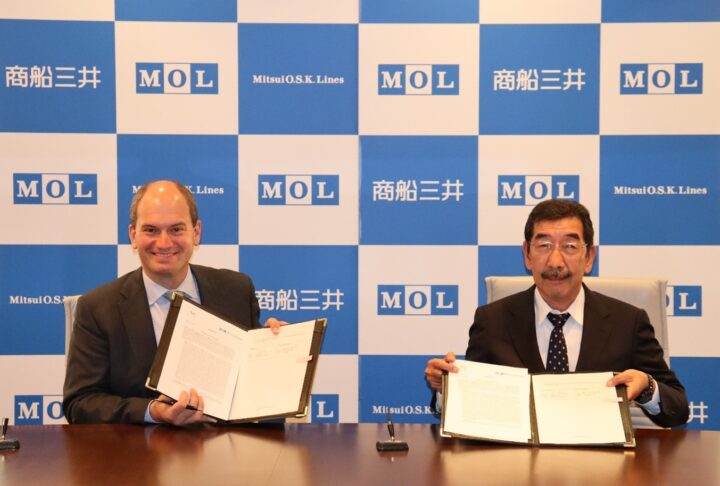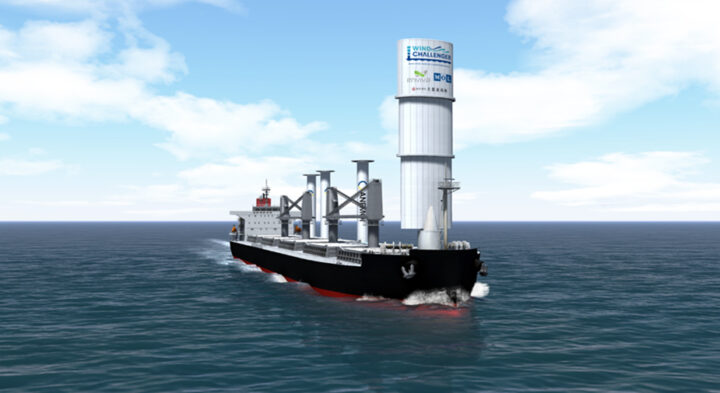Enviva and MOL Drybulk to Deploy Bulk Carrier to Reduce GHG Emissions in the Woody Biomass Supply Chain

Thomas Meth, Chief Commercial Officer of Enviva (left) and Kazuhiko Kikuchi, President of MOL Drybulk (right) at the signing ceremony.
BETHESDA, MD and TOKYO, JP May 19, 2022 — Enviva Inc. (NYSE: EVA), the world’s leading producer of sustainable wood bioenergy, and MOL Drybulk Ltd. (MOLDB), a subsidiary of Mitsui O.S.K. Lines Ltd. (MOL), a leading global marine transport group, announced they have signed an additional memorandum of understanding to deploy an environmentally friendly bulk carrier (“EFBC”) to reduce the greenhouse gas (“GHG”) emissions in the ocean transportation of sustainable wood pellets and biofuels. Following a successful joint study phase, the EFBC is scheduled for launch in 2024 and will aim to utilise rotor sail technology developed by Anemoi Marine Technologies Ltd together with MOL’s ‘Wind Challenger’ technology, which would both reduce emissions by harnessing wind energy, for an expected average GHG savings of about 20 percent in total. The 62,900-deadweight tons (dwt) vessel will be built by Oshima Shipbuilding.
Sustainably sourced wood pellets, like the ones Enviva produces, are considered carbon-neutral even after taking into account the full supply chain, and have been proven to reduce greenhouse gas emissions by up to 85 percent on a lifecycle basis compared to coal. As part of Enviva’s goal to achieve net-zero greenhouse gas emissions from its operations by 2030, the company has committed to addressing scope 3 emissions by proactively engaging with partners like MOLDB to develop and implement new clean energy solutions. As shipping pellets across the Atlantic Ocean currently comprises one third of Enviva’s supply chain emissions, this partnership will generate a large carbon savings in its upstream and downstream value chain.
“Reducing greenhouse gas emissions in our supply chain is a foremost priority for us,” said Thomas Meth, Chief Commercial Officer of Enviva. “While we have made progress in reducing our operations’ CO2 footprint, there are more innovative opportunities like the one we are partnering on with MOLDB to continue to strive for more circular approaches in our supply chain. We couldn’t be more excited about continuing to build on our relationship with MOLDB to help reach our goals of achieving net-zero greenhouse gas emissions by 2030.”
Kazuhiko Kikuchi, President and Representative Director of MOLDB said, “We are very happy to make this announcement today alongside our long-term partner, Enviva. Their support and commitment to this project is invaluable. The purpose of launching MOLDB is to become a team of professionals in the dry bulk business, working closely with our customers to meet their needs and provide solutions. The EFBC is a great example, and we cannot wait to see this truly unique vessel set her sails and catch the wind.”
Plans to develop the Wind Challenger started in 2009 as an industry-academia joint research project led by the University of Tokyo. MOL took charge of the plan in 2018 and has been working on the technology since. The first Wind Challenger is scheduled to be released in the second half of this year. The system converts wind energy to propulsive force with a telescopic hard sail. The long-term goal is to develop a widely accepted shipping solution to achieve the International Maritime Organization target in combination with other measures to reduce GHG by equipping vessels with multiple sails.

About Enviva
Enviva Inc. (NYSE: EVA) is the world’s largest producer of wood pellets, a renewable and sustainable energy source produced by aggregating a natural resource, wood fiber, and processing it into a transportable form, wood pellets. Enviva owns and operates ten plants with a combined production capacity of approximately 6.2 million metric tons per year in Virginia, North Carolina, South Carolina, Georgia, Florida, and Mississippi. Enviva sells most of its wood pellets through long-term, take-or-pay off-take contracts with creditworthy customers in the United Kingdom, the European Union, and Japan, helping to accelerate the energy transition and to decarbonize hard-to-abate sectors like steel, cement, lime, chemicals, and aviation fuels. Enviva exports its wood pellets to global markets through its deep-water marine terminals at the Port of Chesapeake, Virginia, the Port of Wilmington, North Carolina, and the Port of Pascagoula, Mississippi, and from third-party deep-water marine terminals in Savannah, Georgia, Mobile, Alabama, and Panama City, Florida.
To learn more about Enviva please visit our website at www.envivabiomass.com. Follow Enviva on social media @Enviva.
CONTACT:
Maria C. Moreno
media@envivabiomass.com
+1-301-657-5560
About MOL Drybulk Ltd. (MOLDB)
MOL Drybulk Ltd. is a unique entity operating vessels ranging from 10,000DWT up to 100,000DWT bulk carriers, wood chip carriers and multi-purpose vessels, with the aim to provide a “one-stop service” to the customers, work collaboratively to meet their needs and provide environmental solutions to reduce the GHG emissions throughout the supply chain.
CONTACT:
ICT Communication Team
DBICT@molgroup.com
Mitsui O.S.K. Lines, Ltd. (MOL)
Mitsui O.S.K. Lines, Ltd. (MOL), as a global marine transport group, operates a global fleet exceeding 700 vessels, including tankers, bulkers, car carriers, ferries, which also extends to offshore projects. Under the “MOLGROUP Environmental Vision 2.0” established in June 2020, MOL clarifies its commitment to achieve sustainable “Net Zero GHG Emissions” through collective efforts with all capabilities within the group.mailto:
About the “Wind Challenger”
The Wind Challenger Project started in 2009 with the “Wind Challenger Plan,” an industry-academia joint research project led by The University of Tokyo, and in January 2018, MOL and Oshima Shipbuilding took charge of the plan and now play a central role in this project. In October 2019, it acquired Approval in Principle (AIP) for the design of a hard sail system.
In December 2020, MOL reached a coal transport deal with Tohoku Electric Power Co., Inc. using a coal carrier equipped with a Wind Challenger sail with the aim to achieve 5% to 8% reduction of the GHG emissions. The vessel will be constructed at Oshima Shipbuilding, and is scheduled to commence service by the end of 2022.
YouTube
https://www.youtube.com/watch?v=bNQXFKqNVp8
Please refer to the following press releases related to the Wind Challenger project:
01 February 2022
Hard Sail Completed for ‘Wind Challenger Project’ and Installation Underway on Large-scale Vessel
March 30, 2021
Enviva and MOL explore GHG emissions reduction technologies for Biomass supply chain
December 10, 2020
MOL. Tohoku Electric Power Sign Deal for Transport Using Coal Carrier Equipped with Hard Sail Wind Power Propulsion System (Wind Challenger)
